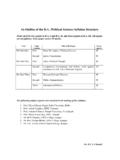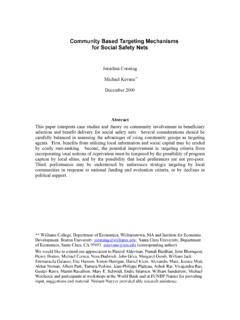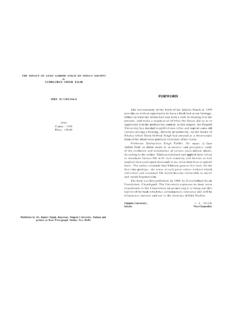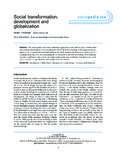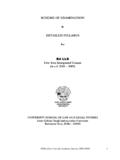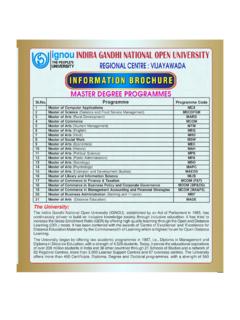Transcription of Development as Freedom - really learning
1 Development as Freedom Amartya Sen Oxford University Press 1999 Summary by Valerie Iles in 2001 Introduction Development can be seen as a process of expanding the freedoms that people enjoy. And if Freedom is what Development is about then it makes sense to concentrate on that rather than on some of the means or instruments of achieving it. This approach contrasts with others such as identifying Development with the growth of GNP, rise in personal incomes, or with industrialisation, technological advance, or social modernisation. These are all important but are means and not ends. Freedoms depend also on other determinants social and economic arrangements ( education and health facilities), political and civil rights. Development requires the removing of major sources of unfreedom: poverty as well as tyranny, poor economic opportunities as well as social deprivation, neglect of public facilities as well as intolerance.
2 The world has unprecedented opulence and yet denies freedoms to vast numbers of people. There is a pivotal difference made by pursuing a view of Development as an integrated process of substantive freedoms that connect with one another. 8 Freedoms are not only the primary ends of Development , they are also among its principal means. There are five distinct types of Freedom , seen in this instrumental perspective: freedoms,2. economic facilities, 3. social opportunities, 4. transparency guarantees, security. Chapter 1. The perspective of Freedom . The usefulness of wealth lies in the things it allows us to do the substantive freedoms it helps us to achieve. but this relation is neither exclusive (there are other influences on us than wealth) nor uniform (since the impact of wealth on our lives varies with other influences).
3 Freedoms involve both processes (libertarians)and opportunities (consequentialists) Poverty and inequality Income deprivations and capability deprivations often appear correlated but it is important to avoid being mesmerised into thinking that taking note of the former would somehow tell us enough about the latter. The connections are not that tight, and the departures are often more important from a policy point of view .. 20 If we shift our attention from income to capability deprivation we can better understand the poverty of human lives .. Incongruity in contemporary European attempts to move to a more self-help social climate without devising adequate policies for reducing the massive and intolerable levels of unemployment that make such self help extremely difficult because it leads to losses of self reliance, self confidence, and psychological and physical health.
4 Income and mortality African Americans are more wealthy than people in much poorer regions such as China, Kerala and Sri Lanka, Jamaica , Costa Rica. But their life expectancy is shorter. The causal influences on these contrasts include social arrangements and community relations such as medical coverage, public health care, school education, law and order, prevalence of violence etc When William Petty pioneered both the income method and the expenditure method of estimating national income he was explicitly concerned with the Common Safety and Each Man s particular Happiness. He was concerned with assessment of people s living conditions. So this approach reclaims some of the heritage of professional economics. Markets and Freedoms There are two arguments in favour of the market mechanism, and they need to be separated out. have a right to undertake transactions and exchange.
5 Restricting this is a direct reduction in Freedom . 2. Markets typically work to expand income and wealth and economic opportunities and so restricting market mechanisms leads to a reduction in freedoms as a result. The discipline of economics has moved away from focusing on the value of freedoms to that of utilities, incomes and wealth. John Hicks: The liberal or non-interference principles of the classical (Smithian or Ricardian) economists were not in the first place economic principles; they were an application to economics of principles that were thought to apply to a much wider field. The contention that economic Freedom made for economic efficiency was no more than a secondary support .. What I do question is whether we are justified in forgetting, as completely as most of us have done, the other side of the argument. Slaves life expectancy and wages were just as high as many other peoples and yet no-one chose that way of life when given a choice.
6 Tradition, culture and democracy Participation is central here. Economic Development of a nation may lead to loss of traditions and cultural heritage. Others may say it is better to be rich and happy than impoverished and traditional. But where is the source of authority and legitimacy it is a choice the people involved have to face and assess. Chapter 2. The ends and the means of Development Two general attitudes to the process of Development found in professional economic analysis and public discussions: 1. it is a fierce process with much blood sweat and tears, where wisdom demands toughness, and a calculated neglect of soft-headed concerns such as social safety nets, social services, too early political rights, civil rights and the luxury of democracy. 2. it is a friendly process exemplified by such things as mutually beneficial exchanges (Adam Smith), social safety nets, political liberties, social Development etc This book supports the latter, seeing Freedom as both the primary end and the principal means of Development .
7 Is political participation and dissent conducive to Development ? Development includes that Freedom of political participation. So Freedom is intrinsic and instrumental to Development . Different kinds of Freedom interrelate with one another, and Freedom of one type may greatly help in advancing Freedom of other types. Instrumental freedoms: political freedoms including civil rights the opportunities people have to determine who should govern and on what principles, the possibility to scrutinise and criticise authorities, Freedom of political expression and uncensored press, choose between political parties etc economic facilities - opps to utilise economic resources for the purpose of consumption or production or exchange. Economic entitlements will depend on resources owned or available for use, conditions of exchange.
8 Availability and access to finance important here. social opportunities arrangements society makes for education, health care etc to help people to live better this helps them to participate in economic and political activities as well as being a good thing in its own right. transparency guarantees the openness that people can expect when dealing with one another protective security to prevent people on the verge of vulnerability from succumbing to deprivation fixed institutional arrangements such as unemployment benefits, and ad hoc arrangements such as famine relief. Interconnections and complementarity Japan a pioneer of economic growth had a higher rate of literacy than European in mid 19C. so not true to say that human Development (health care education etc) is a luxury that only rich countries can afford it s a way of them becoming rich.
9 China India contrast Both making efforts to move towards a more open and internationally active market economy India since 1979, China since 1991. China previously very sceptical about markets but very pro education and health care. so literate population. India had a half-illiterate population and neglect of basic health care for a large proportion of its population. China lacks political freedoms and that is manifest in lack of flexibility of economic policy leading to famine the largest in recorded history (30m in the wake of the Great Leap Forward 1958-61). India has not had a famine since independence the protective power of democracy. Growth mediated social arrangements On the basis of intercountry comparisons it is possible to say that life expectancy is correlated with GNP per head, but this relationship works through the impact of GNP on 1.
10 The incomes specifically of the poor 2. public expenditure on health care Indeed if these two variables are included on their own little extra explanation is obtained by adding gnp per head. In east Asia and south east Asia widespread economic participation has been easier to achieve than in say Brazil, India or Pakistan, because of basic education, health care, and early completion of effective land reforms. Two interesting contrasts here: 1. countries with high economic growth contrast between a. those with success in raising length and quality of life ( and Taiwan) and b. those with less success (Brazil) 2. for economies with success in raising length and quality of life the contrast between a. those with great success in high economic growth (S>Korea and Taiwan) and b. those without much success in high economic growth (Sri Lanka, pre reform China, Indian state of Kerala).

